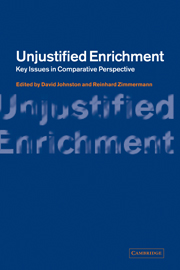Book contents
- Frontmatter
- Contents
- List of contributors
- Preface
- Table of cases
- List of abbreviations
- I Introduction
- II Enrichment ‘without legal ground’ or unjust factor approach
- III Failure of consideration
- 4 Failure of consideration: myth and meaning in the English law of restitution
- 5 Failure of consideration
- IV Duress and fraud
- V Change of position
- VI Illegality
- VII Encroachment and restitution for wrongs
- VIII Improvements
- IX Discharge of another person's debt
- X Third-party enrichment
- XI Proprietary issues
- XII Taxonomy
- Index
5 - Failure of consideration
Published online by Cambridge University Press: 31 July 2009
- Frontmatter
- Contents
- List of contributors
- Preface
- Table of cases
- List of abbreviations
- I Introduction
- II Enrichment ‘without legal ground’ or unjust factor approach
- III Failure of consideration
- 4 Failure of consideration: myth and meaning in the English law of restitution
- 5 Failure of consideration
- IV Duress and fraud
- V Change of position
- VI Illegality
- VII Encroachment and restitution for wrongs
- VIII Improvements
- IX Discharge of another person's debt
- X Third-party enrichment
- XI Proprietary issues
- XII Taxonomy
- Index
Summary
Introduction
‘Consideration’ is a feature both of the English law of contract and of the law of restitution. We are told that in the law of contract it is the quid pro quo in an agreement that makes it binding as a contract. Within the law of restitution its meaning is different: Graham Virgo says that ‘failure of consideration is not a ground of restitution in its own right but rather a general principle which underlies the existence of a number of particular grounds of restitution’. He then proceeds to discuss three possible grounds of recovery: total failure of consideration, partial failure of consideration and no consideration. In this restitutionary context ‘consideration’ is understood generally as ‘the condition which formed the basis for the plaintiff transferring a benefit to the defendant’.
The separation between the contractual and restitutionary meanings of ‘consideration’ has not always been so clearly made. Although the background is rather complex, there is evidence to suggest that the influence of the civil law was an important factor in leading to this separation of meanings in English law when it was finally unequivocally reached. In a series of decisions known collectively as the ‘Coronation’ cases, English law provided a result which came, in time, to be regarded as unsatisfactory by leading English lawyers. The result that was reached in the ‘Coronation’ cases proceeded on the assumption that there was no distinction between the contractual and restitutionary meanings of ‘consideration’.
- Type
- Chapter
- Information
- Unjustified EnrichmentKey Issues in Comparative Perspective, pp. 128 - 156Publisher: Cambridge University PressPrint publication year: 2002



